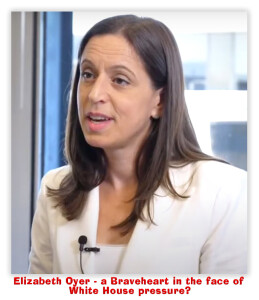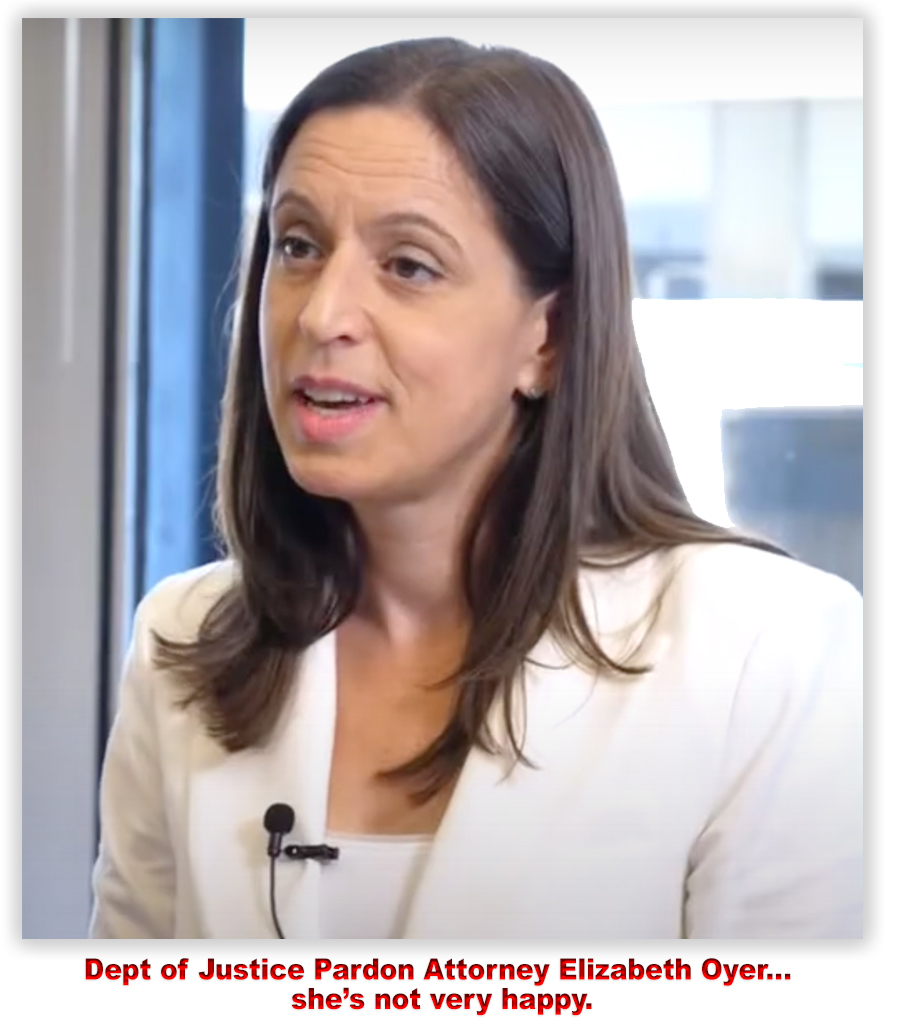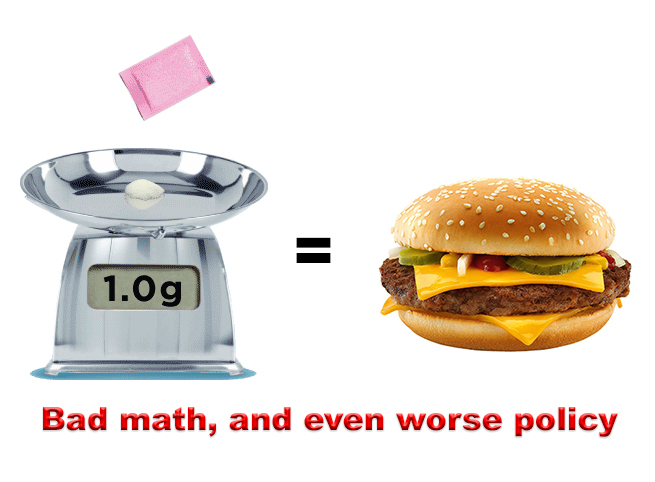We post news and comment on federal criminal justice issues, focused primarily on trial and post-conviction matters, legislative initiatives, and sentencing issues.

GOODBYE, LIZ… WE HARDLY KNEW YE
 Notoriously apolitical and dedicated Dept of Justice Pardon Attorney Elizabeth G. Oyer was abruptly fired and frog-marched out of the DOJ building by security last Friday morning. Her crime? According to this morning’s New York Times, Oyer refused to recommend restoration of gun rights to actor Mel Gibson, who is disqualified from possessing a lethal weapon due to a 2011 misdemeanor conviction for battering his girlfriend.
Notoriously apolitical and dedicated Dept of Justice Pardon Attorney Elizabeth G. Oyer was abruptly fired and frog-marched out of the DOJ building by security last Friday morning. Her crime? According to this morning’s New York Times, Oyer refused to recommend restoration of gun rights to actor Mel Gibson, who is disqualified from possessing a lethal weapon due to a 2011 misdemeanor conviction for battering his girlfriend.
Under 18 USC § 922(g)(8), a conviction for a misdemeanor crime of domestic violence disqualifies a person from possessing a firearm or ammunition that has traveled in interstate commerce. While it is possible for a person disqualified under § 922(g) – which lists multiple categories of people not allowed to have guns – to possess a firearm that was manufactured in the same state in which the person lives, the courts have long held that no commercial ammunition is made entirely of components produced in a single state.
In 2011, Gibson pleaded no contest in Los Angeles Superior Court to a charge of misdemeanor battery stemming from a January 2010 fight he had with Oksana Grigorieva, his ex-girlfriend and the mother of his then 1-year-old daughter. Gibson was sentenced to 36 months of informal probation, community service, a year of domestic violence counseling, and $570 in fines. In an incident which must have had a fascinating backstory, prosecutors also agreed not to charge Grigorieva with extortion, citing insufficient evidence. Gibson had alleged that she tried to extort money from by leaking multiple recordings of him purportedly yelling at her.
Oyer said through a spokesperson yesterday that about two weeks ago, she was assigned to a working group to restore gun rights to people convicted of crimes. The group was headed by Paul Perkins of the deputy attorney general’s office and James McHenry, the acting attorney general, two sources familiar with the effort told NBC.
As The New York Times described it, “It was an unusual assignment for the office of the pardon attorney, which typically handles requests for clemency and tries to focus on people who cannot hire well-connected lawyers to plead their cases to the White House, where the president has vast power to grant pardons in federal cases. Mr. Trump has a history of making pardon decisions without substantial input from the pardon attorney, but in this case Justice Department leaders planned to make the decision about gun rights on their own.”
 NBC News reported today that the working group was “instructed to find a way to restore gun rights to entire classes of previously convicted people. Because ATF is technically prohibited from processing such requests, the plan was to give the authority to the pardon attorney and for there to be a semi-automated process. That was in stark contrast to how the pardon office normally works, which is by evaluating each application case by case and making recommendations.”
NBC News reported today that the working group was “instructed to find a way to restore gun rights to entire classes of previously convicted people. Because ATF is technically prohibited from processing such requests, the plan was to give the authority to the pardon attorney and for there to be a semi-automated process. That was in stark contrast to how the pardon office normally works, which is by evaluating each application case by case and making recommendations.”
A list of about 95 people made the initial list, but that was cut to about nine. Oyer prepared a draft memorandum for the group, but after she submitted the draft, she was asked to add Gibson’s name to the list and was given a letter that Gibson’s attorney had sent asking DOJ to restore his gun rights.
She refused to do so, explaining that she lacked enough information about the 2011 conviction to make a recommendation. However, she soon got a phone call from the deputy attorney general’s office asking whether her position on Gibson was flexible. When she said it was not, NBC said, Oyer was told that “Mel Gibson is a friend of the president and that should be justification enough.”
On Friday morning, NBC said, Oyer submitted a second draft memo that summarized the information she had available on Gibson – including not just the 2011 conviction but also reports of Gibson’s 2006 drunken anti-semitic tirade to LA cops – and made no any recommendation to the attorney general
Shortly after that, she was handed her termination notice and marched out.
 “This is dangerous. This isn’t political — this is a safety issue,” Oyer told The New York Times. In a statement to NBC, Oyer described a climate of fear within the DOJ. “Unfortunately, experienced professionals throughout the Department are afraid to voice their opinions because dissent is being punished,” she was quoted as saying. “Decisions are being made based on relationships and loyalty, not based on facts or expertise or sound analysis, which is very alarming given that what is at stake is our public safety.”
“This is dangerous. This isn’t political — this is a safety issue,” Oyer told The New York Times. In a statement to NBC, Oyer described a climate of fear within the DOJ. “Unfortunately, experienced professionals throughout the Department are afraid to voice their opinions because dissent is being punished,” she was quoted as saying. “Decisions are being made based on relationships and loyalty, not based on facts or expertise or sound analysis, which is very alarming given that what is at stake is our public safety.”
The Times said that Oyer’s account of the gun debate over Gibson and others was confirmed by two other people familiar with the events, who spoke on the condition of anonymity because they feared retaliation.
A Justice Department official familiar with the matter told NBC News and The Times that Oyer’s firing was not related to the Gibson case. “The Mel Gibson decision did not play a role in termination decision,” said the official, who spoke on the condition of anonymity. “The paperwork was done before the Mel Gibson email went out.”
However, NBC reported that a second senior Justice Department official, who was not authorized to speak publicly, said Oyer’s ouster “is part of a very concerning set of personnel moves across the federal government and at DOJ” in which officials who might act as checks on abuses of power were being fired.
“I don’t know how much of what happened to Liz was a failure to toe the line about a specific thing,” the DOJ official is quoted as saying. “But, systematically, the political leadership of this administration is doing their best to take away the institutional guardrails.”
Oyer was appointed by President Joe Biden. She was a breath of fresh air in the Pardon Office backwater, spearheading sessions at federal prisons where she spoke to inmates about the pardon process and dismissing a stack of very old and stale clemency petitions to try to reset the process. All too often, both Biden and (in the last six weeks) Trump appeared on more than one occasion to ignore her role in the pardon process when it suited them.
As for the gun rights restoration push, NBC reported that while a system has not yet been set up to review gun rights restoration applications, “there have been talks to have the attorney general immediately begin restoring rights to a pre-set list of people in the meantime, two law enforcement officials familiar with the matter said.”
New York Times, Justice Dept. Official Says She Was Fired After Opposing Restoring Mel Gibson’s Gun Rights (March 11, 2025)
NBC News, DOJ official says she was fired after opposing the restoration of Mel Gibson’s gun rights (March 11, 2025)
– Thomas L. Root

















